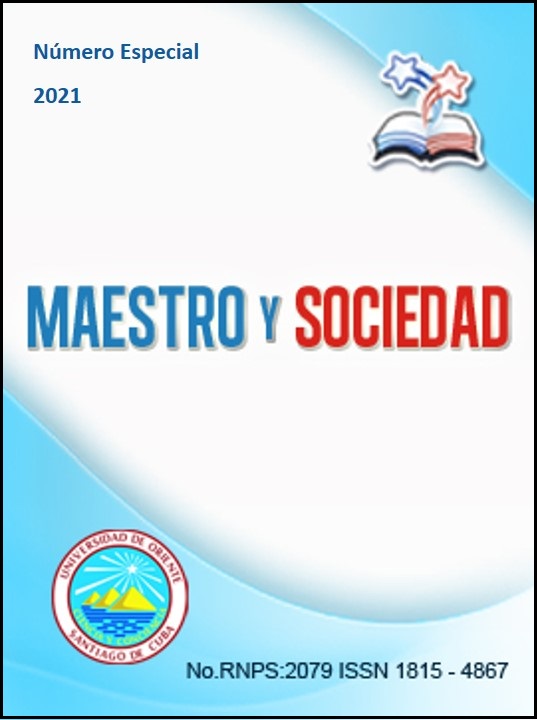The socio-pedagogy of social representation in cultural identity in higher education
Array
Keywords:
representation, higher education, vocational trainingAbstract
The social representation that higher education has as a process has the purpose of developing strategies in the training of the pedagogical, humanistic and social professional for the development of human transformative capacity, through training processes. However, in the process of vocational training there are inadequacies in the achievement of an adequate and complete preparation of the educational phenomenon. Through critical reflection, the problem is analyzed, as well as the proposal of a socio-pedagogical approach that will allow the understanding of the problem and its possible solution, from theory to the creation of pathways in pedagogical practice and humanistic sciences.
References
2. Alba C., O., Gómez P., J. A., y Colón M., N. (2014). La formación profesional basada en competencias y formación de emprendedores: ¿encuentros o desencuentros? Revista Maestro y Sociedad, 11(2), 1-10. https://revistas.uo.edu.cu/index.php/MyS/article/view/1591/1563
3. Basto C., R. M., & Basto R., M. A. (2018). Tendencias históricas del proceso de formación continúa de la orientación profesional en la educación preuniversitaria. Revista Maestro y Sociedad, (Número Especial I Simposio Internacional de Ciencias Pedagógicas), 27-41. https://revistas.uo.edu.cu/index.php/MyS/article/view/3375/2993
4. Blanco, A. (2001). Introducción a la Sociología de la Educación. La Habana: Ed. Pueblo y Educación.
5. Bourdieu, P., & Passeron, J. C. (1998). La reproducción. Elementos para una teoría del sistema de enseñanza. México, D.F.: Fontamara.
6. Hernández, F., & Sancho, J. M. (2006). Para enseñar no basta con saber la asignatura. Barcelona: Ediciones Paidós
7. Martínez I., R., & Rivera F., C. L. (2016). La construcción de proyectos de formación pedagógica permanente: Una mirada desde la educación superior no pedagógica. Revista Maestro y Sociedad, 13(1), 3-17. https://revistas.uo.edu.cu/index.php/MyS/article/view/954/1144
8. Morasén C., R. (2018). La representación social del envejecimiento en sujetos caribeños residentes en la ciudad de Santiago de Cuba. Revista Maestro y Sociedad, (número especial 4), 42-53. https://revistas.uo.edu.cu/index.php/MyS/article/view/3640/3194 9.
9. Moscovici, S. (1993). Psicología social II. Pensamiento y vida social. Psicología social y problemas sociales. Barcelona: Ediciones Paidós.
10. Pérez R., M. C., & Yera D., N. (2014). Implementación del prontuario en la formación del profesional. Revista Maestro y Sociedad, 11(1), 18-24. https://revistas.uo.edu.cu/index.php/MyS/article/view/1636/1612
11. Torres, R. M. (2003). ¿Qué y cómo es necesario aprender? Necesidades básicas de aprendizaje y contenidos curriculares. Santiago de Chile: UNESCO, IDCR.
Published
How to Cite
Issue
Section
License
This journal provides immediate open access to its content, based on the principle that offering the public free access to research helps a greater global exchange of knowledge. Each author is responsible for the content of each of their articles.



























 Universidad de Oriente
Universidad de Oriente 